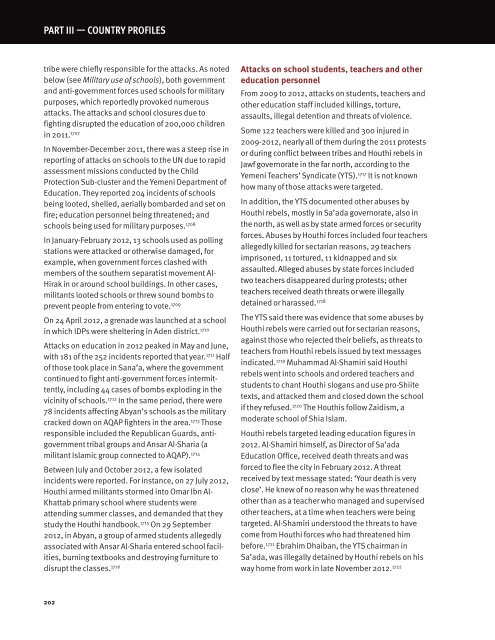eua_2014_full.pdf?utm_content=buffer4a392&utm_medium=social&utm_source=twitter
eua_2014_full.pdf?utm_content=buffer4a392&utm_medium=social&utm_source=twitter
eua_2014_full.pdf?utm_content=buffer4a392&utm_medium=social&utm_source=twitter
- No tags were found...
You also want an ePaper? Increase the reach of your titles
YUMPU automatically turns print PDFs into web optimized ePapers that Google loves.
PART III — COUNTRY PROFILeStribe were chiefly responsible for the attacks. As notedbelow (see Military use of schools), both governmentand anti-government forces used schools for militarypurposes, which reportedly provoked numerousattacks. The attacks and school closures due tofighting disrupted the education of 200,000 childrenin 2011. 1707In November-December 2011, there was a steep rise inreporting of attacks on schools to the UN due to rapidassessment missions conducted by the ChildProtection Sub-cluster and the Yemeni Department ofEducation. They reported 204 incidents of schoolsbeing looted, shelled, aerially bombarded and set onfire; education personnel being threatened; andschools being used for military purposes. 1708In January-February 2012, 13 schools used as pollingstations were attacked or otherwise damaged, forexample, when government forces clashed withmembers of the southern separatist movement Al-Hirak in or around school buildings. In other cases,militants looted schools or threw sound bombs toprevent people from entering to vote. 1709On 24 April 2012, a grenade was launched at a schoolin which IDPs were sheltering in Aden district. 1710Attacks on education in 2012 peaked in May and June,with 181 of the 252 incidents reported that year. 1711 Halfof those took place in Sana’a, where the governmentcontinued to fight anti-government forces intermittently,including 44 cases of bombs exploding in thevicinity of schools. 1712 In the same period, there were78 incidents affecting Abyan’s schools as the militarycracked down on AQAP fighters in the area. 1713 Thoseresponsible included the Republican Guards, antigovernmenttribal groups and Ansar Al-Sharia (amilitant Islamic group connected to AQAP). 1714Between July and October 2012, a few isolatedincidents were reported. For instance, on 27 July 2012,Houthi armed militants stormed into Omar Ibn Al-Khattab primary school where students wereattending summer classes, and demanded that theystudy the Houthi handbook. 1715 On 29 September2012, in Abyan, a group of armed students allegedlyassociated with Ansar Al-Sharia entered school facilities,burning textbooks and destroying furniture todisrupt the classes. 1716Attacks on school students, teachers and othereducation personnelFrom 2009 to 2012, attacks on students, teachers andother education staff included killings, torture,assaults, illegal detention and threats of violence.Some 122 teachers were killed and 300 injured in2009-2012, nearly all of them during the 2011 protestsor during conflict between tribes and Houthi rebels inJawf governorate in the far north, according to theYemeni Teachers’ Syndicate (YTS). 1717 It is not knownhow many of those attacks were targeted.In addition, the YTS documented other abuses byHouthi rebels, mostly in Sa’ada governorate, also inthe north, as well as by state armed forces or securityforces. Abuses by Houthi forces included four teachersallegedly killed for sectarian reasons, 29 teachersimprisoned, 11 tortured, 11 kidnapped and sixassaulted.Alleged abuses by state forces includedtwo teachers disappeared during protests; otherteachers received death threats or were illegallydetained or harassed. 1718The YTS said there was evidence that some abuses byHouthi rebels were carried out for sectarian reasons,against those who rejected their beliefs, as threats toteachers from Houthi rebels issued by text messagesindicated. 1719 Muhammad Al-Shamiri said Houthirebels went into schools and ordered teachers andstudents to chant Houthi slogans and use pro-Shiitetexts, and attacked them and closed down the schoolif they refused. 1720 The Houthis follow Zaidism, amoderate school of Shia Islam.Houthi rebels targeted leading education figures in2012. Al-Shamiri himself, as Director of Sa’adaEducation Office, received death threats and wasforced to flee the city in February 2012. A threatreceived by text message stated: ‘Your death is veryclose’. He knew of no reason why he was threatenedother than as a teacher who managed and supervisedother teachers, at a time when teachers were beingtargeted. Al-Shamiri understood the threats to havecome from Houthi forces who had threatened himbefore. 1721 Ebrahim Dhaiban, the YTS chairman inSa’ada, was illegally detained by Houthi rebels on hisway home from work in late November 2012. 1722202


